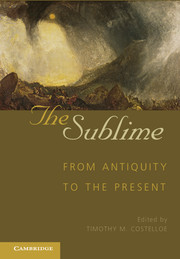Book contents
- Frontmatter
- Contents
- List of Illustrations
- Contributors
- Acknowledgments
- The Sublime
- Part One Philosophical History of the Sublime
- 1 Longinus and the Ancient Sublime
- 2 … And the Beautiful?
- 3 The Moral Source of the Kantian Sublime
- 4 Imagination and Internal Sense
- 5 The Associative Sublime
- 6 The “Prehistory” of the Sublime in Early Modern France
- 7 The German Sublime After Kant
- 8 The Postmodern Sublime
- Part Two Disciplinary and other Perspectives
- 10 The First American Sublime
- 11 The Environmental Sublime
- 12 Religion and the Sublime
- 13 The British Romantic Sublime
- 14 The Sublime and the Fine Arts
- 15 Architecture and the Sublime
- Bibliography
- Index
- References
6 - The “Prehistory” of the Sublime in Early Modern France
An Interdisciplinary Perspective
Published online by Cambridge University Press: 05 January 2015
- Frontmatter
- Contents
- List of Illustrations
- Contributors
- Acknowledgments
- The Sublime
- Part One Philosophical History of the Sublime
- 1 Longinus and the Ancient Sublime
- 2 … And the Beautiful?
- 3 The Moral Source of the Kantian Sublime
- 4 Imagination and Internal Sense
- 5 The Associative Sublime
- 6 The “Prehistory” of the Sublime in Early Modern France
- 7 The German Sublime After Kant
- 8 The Postmodern Sublime
- Part Two Disciplinary and other Perspectives
- 10 The First American Sublime
- 11 The Environmental Sublime
- 12 Religion and the Sublime
- 13 The British Romantic Sublime
- 14 The Sublime and the Fine Arts
- 15 Architecture and the Sublime
- Bibliography
- Index
- References
Summary
INTRODUCTION
According to the story told until recently, the sublime first burst onto the French scene in 1674. This was the date that Nicholas Boileau Despréaux (1636–1711), “Lawmaker of the poets,” published the Traité du sublime ou du merveilleux dans le discours, his French translation of the Peri hupsous περι ϋψονς. Boileau claimed that, without it, the author he called Longinus would “only be known to a very few scholars.” Scholars since have treated at length the preeminence of Boileau’s work in late seventeenth-century France, from its importance in the quarrel of the ancients and the moderns to the parallels with the je ne sais quoi of Dominique Bouhours (1671) and from the Réflexions of René Rapin (1674) to the interpretations of Pierre Daniel Huet (1630–1721).
Outside French studies, however, we are apt to find this assessment: Boileau led early modernity to identify “sublimity simply with excellence.” The Traité du sublime thus offered a merely technical and rhetorical starting point for the sublime, which was not yet associated with aesthetics and the visual arts. Many critics have suggested that the truly fascinating sublime – the sublime of “overwhelming or transporting” – emerged later and elsewhere. Jean-François Lyotard’s thesis is well known: the sublime understood as a “mode of sensibility” is specific to modernity.
- Type
- Chapter
- Information
- The SublimeFrom Antiquity to the Present, pp. 77 - 101Publisher: Cambridge University PressPrint publication year: 2012
References
- 7
- Cited by



